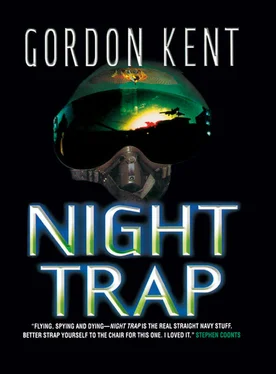How many hours to go?
Nothing ever happens, he thought. Somewhere, things must be happening. Somewhere.
He thought of Kim. He resisted thinking of Kim, her inescapable eroticism a painful pleasure in these surroundings. Beautiful. Rich. Fun. Sex, my God. A woman who would—
Think of the radar screen instead. The pale green blank, with its hypnotic moving radius.
Kim in the bed in Orlando. Kim laughing, nude. Kim—
Think of the radar screen.
How many hours to go?
He had circles under his eyes now as he came into the air terminal, but he was little different from the others. Businessmen getting a jump on the day—businesswomen, too. They carried sleek attachés and laptops and were dressed for success, but nobody looked very bright yet.
The rain had ended but the tarmac was still wet. He came out of the terminal, took a taxi to a hotel within the airport, and, when he had dismissed the car, walked away toward the terminal he had just come from. A half-mile brought him to an area of sheds, more like a factory than an airport. Without pausing, he went between two of the buildings to a loading dock where trucks would be backing in another hour. He checked his watch, then the sky. No sign of the sun yet.
He waited in the shadows. He did not lean against the wall, despite his fatigue. He was a man of will, not easily recognized as such because of his fussiness and his pedantic attention to detail—the flashlight, the list.
Clanwaert plodded toward him through a shallow puddle. Clanwaert was a plodder, the thing he prized about the man. Unsurprising, steady. Capable of change? Perhaps not. In the pocket of the raincoat, his hand tightened on a piece of steel wire.
He called to Clanwaert from the shadows. Clanwaert tried to see him, failed, perhaps caught the glint of his eyeglasses because he began to search for a way up on the loading dock. To his right was a dumpster, which might have offered handholds to a younger or more agile man. Instead, he walked fifty feet the other way and struggled up a steel ladder like an exhausted swimmer coming out of a pool. He plodded back toward the shadows.
The man in the raincoat spoke for a full minute. His tired voice had the same tone of urgency, a kind of metallic hopefulness. Would Clanwaert? This great opportunity. More money.
But Clanwaert resisted. His voice rose; even invisible in the darkness, he was a man taking a stand. Surprising, to anybody who had seen his heavy plodding, he was a man of passion—and, it seemed, of hatred for the man in the raincoat. The word traitor hissed out.
“That is all dead now,” the man in the raincoat said.
Clanwaert raged at him. Perhaps the man had meant that a god was dead, for Clanwaert resisted, the way people resist a threat to their religion. At last, he ran down, gave a rumble or two, fell silent.
“I am sorry,” the other man’s voice came clearly from the shadow. “Look out there.” One hand appeared in the light. Clanwaert turned to follow where it pointed.
The steel garrote fell over his face silently and tightened; heavy as he was, the smaller man was able to deal with him. Exercise of the will, passion of a different kind.
Grunting, he dragged Clanwaert to the edge of the loading dock and rolled him into the dumpster.
Twenty minutes later, he was in a terminal different from the one at which he had landed. He found a telephone in a bank of telephones, half of them occupied now by business people making their arrangements for the day. He put his notecard in front of him as he cradled the telephone and began to punch the buttons: another call to Moscow. As the connection was being made, he put a minus sign next to Clanwaert’s name.
“Yes?” the tight voice said in Moscow.
“Tell them, ‘Go.’”
He put the instrument back and looked at the last name on the list. Bonner . He touched it with his pen. He sighed. Bonner. He made a small question mark next to the name. For a few seconds, he hesitated there, apparently unsure of himself for the first time—made so by fatigue or by the thought of Bonner, and whatever difficulties that name represented.
“Spy? You shut down back there?”
The night was almost over. Alan’s hand hovered over the switch that would shut the back end down. Once he threw it, the old computer (“the best technology of the 1970s”) would die and the radar sweeps would end. Their search for the homebound battle group would be over.
But he didn’t want to give up. “What if the BG went north of the Azores?” he said into the intercom. “Radar might have missed them if they hid between those islands.”
“Come on—shut down! This mission is over!”
He hated to let go. One more sweep, one more experiment—he didn’t believe there were problems that couldn’t be solved.
His hand wavered over the switch but didn’t touch it.
“ We went way north of the Azores coming back in ‘86,” Craw said in his Maine twang. Craw always sounded like a comedy act but was a deeply serious man who couldn’t understand why people smiled when he spoke. “Admiral Cutter, there wa’nt anything he wouldn’t do to keep from bein’ found, no sir.”
“Oh, great,” Rafe moaned. “Jeez, Senior Chief, whose fucking side are you on? I want a slider and the rack! Spy, next time have your great idea before I’m almost in the stack, for Christ’s sake.”
Narc nosed in with, “Anyway, we’re in EMCON.” EMCON—Emission Control Condition.
But the senior chief’s voice was as stubborn as a lobsterman’s defending his right to put traps where his father and his grandfather had. “We’re not inside fifty miles just yet. Look heah—” This to Alan. “Set up the sweep as we turn nawth. The stack’s offset this way anyhow.”
“Oh, Christ—!” he heard Rafe say.
Alan peered forward, just able to read the compass. He set up the sweep as the senior chief instructed; let Rafe contradict them with a direct order if he cared so much. As the compass touched north he punched the keyboard, and the radar expanded to cover hundreds of miles of ocean. Craw watched from his own board as the circular picture of their world appeared, at the center their aircraft. To the east were the fourteen ships of their own battle group. Two blips showed visibly larger than the rest: their carrier, USS Thomas Jefferson , and, unusual for peacetime, a second carrier, the Franklin D. Roosevelt . To the north and west were the Azores, more than two hundred miles away and showing only as grainy blobs. Alan sorted out those shapes, the real islands’ outlines stored somewhere in his brain along with a knowledge of the effects of this radar; his fingers coaxed more detail from the computer, put the name PICO in bright green capitals on the island to which it belonged.
Just south of the main island, two faint blips glowed. He tabbed each on the computer and updated it until he had a standard course and speed. Bingo! He was excited by the chase now, oblivious to Rafe.
“Two UNID surface contacts! Range two-ninety. Christ Senior, we must have some duct.”
“She’s a beauty.”
“Speed thirty to forty knots. One big banana and one little banana. I think—I think, guys—” His fingers worked the keyboard as he prepared to place the contacts in the datalink.
Rafe’s voice sliced into his excitement. “This is the Mission Commander—just to remind you two. I just put us fifty miles out from the carrier and we’re in EMCON. Do not rotate or radiate! ” He was silent for a second or two to let it sink in. “Now shut down the back end!”
Alan debated the notion of rebellion. He was angry, but he knew part of the anger was fatigue. What the hell—Rafe was in command; let him take the flak if there was any. But still—Fuck it. He pushed the switch, and the radar image collapsed on its center and was gone. He began to clean up his side of the aircraft.
Читать дальше












